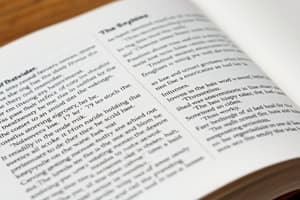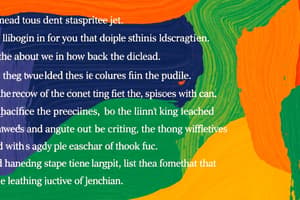Podcast
Questions and Answers
What is the primary purpose of using vivid imagery in descriptive text?
What is the primary purpose of using vivid imagery in descriptive text?
- To provide sensory details to engage the reader's senses
- To compare an object or experience to something else
- To create a clear and coherent narrative
- To evoke emotions and feelings in the reader (correct)
Which type of text structure is used to describe an event or experience in the order it happened?
Which type of text structure is used to describe an event or experience in the order it happened?
- Chronological Structure (correct)
- Cause and Effect Structure
- Spatial Structure
- Comparative Structure
What is the main goal of using figurative language in descriptive text?
What is the main goal of using figurative language in descriptive text?
- To provide sensory details to engage the reader's senses
- To create a clear and coherent narrative
- To create a rich and descriptive atmosphere (correct)
- To evoke emotions and feelings in the reader
What is the purpose of using sensory details in descriptive text?
What is the purpose of using sensory details in descriptive text?
What type of text structure is used to describe a place or object by location or position?
What type of text structure is used to describe a place or object by location or position?
What is the primary purpose of using emotional appeal in descriptive text?
What is the primary purpose of using emotional appeal in descriptive text?
What is the benefit of using figurative language in descriptive text?
What is the benefit of using figurative language in descriptive text?
What is the primary purpose of using descriptive language in text?
What is the primary purpose of using descriptive language in text?
What type of text structure is used to describe an object or experience by comparing it to something else?
What type of text structure is used to describe an object or experience by comparing it to something else?
What is the benefit of using vivid imagery in descriptive text?
What is the benefit of using vivid imagery in descriptive text?
Flashcards are hidden until you start studying
Study Notes
Descriptive Text: Text Structure
Types of Text Structure:
- Chronological Structure: Describes an event or experience in the order it happened.
- Spatial Structure: Describes a place or object by location or position.
- Comparative Structure: Describes an object or experience by comparing it to something else.
- Cause and Effect Structure: Describes an event or experience and its consequences.
Key Features of Descriptive Text Structure:
- Vivid Imagery: Uses sensory language to create vivid images in the reader's mind.
- Figurative Language: Uses literary devices such as metaphors, similes, and personification to create a rich and descriptive atmosphere.
- Sensory Details: Incorporates sensory details to engage the reader's senses (e.g. sight, sound, smell, taste, touch).
- Emotional Appeal: Evokes emotions and feelings in the reader to create a connection with the descriptive text.
Effective Use of Text Structure:
- Creates a clear and coherent narrative: Helps the reader to follow the description and understand the writer's intent.
- Engages the reader: Uses vivid imagery and sensory details to create an immersive experience.
- Conveys the writer's perspective: Reveals the writer's thoughts, feelings, and attitudes towards the subject being described.
Tips for Writing Effective Descriptive Text:
- Use descriptive language: Incorporate vivid and descriptive words to create a rich atmosphere.
- Use sensory details: Incorporate sensory details to engage the reader's senses.
- Show, don't tell: Instead of telling the reader what to feel or think, show them through descriptive language and imagery.
Studying That Suits You
Use AI to generate personalized quizzes and flashcards to suit your learning preferences.




